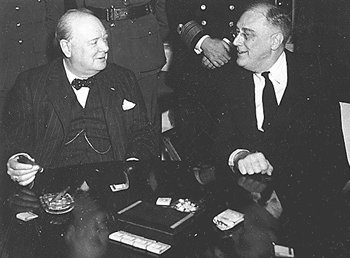The Saved and the Thankful

Seventy-six years ago today, the Japanese attacked Pearl Harbor. President Roosevelt famously called it a day that would “live in infamy.”
But what was it to Winston Churchill, far across the Atlantic in blacked-out and battered England, fighting the Germans alone?
By December 1941, England had already been at war with the Germans for over two years. Since 1940, the British had been subject to unremitting air raids during the Blitz. More than 40,000 civilians were killed. In London, more than a million homes and buildings were destroyed or damaged.
During these years, Churchill kept almost daily correspondence with Roosevelt, cajoling, warning, and pleading, trying to convince him to join the war. Roosevelt did what he could, mainly sending some ships, guns and envoys, but his hands were tied. U.S. public opinion wanted nothing to do with another war in Europe.
Then the Japanese attacked Pearl Harbor. At the time, Churchill was at Chequers, the country house of British prime ministers. He heard the news on the radio, and called the president right away to confirm. “We’re in the same boat now,” Roosevelt told him, and Churchill spent the evening listening to BBC reports with a strange mix of emotions, the strongest of which was exhilarated relief. England was no longer alone. That night, as he wrote in his memoirs, he “slept the sleep of the saved and thankful.”
The next day, Churchill lost no time and invited himself to the White House. He and his advisors sailed to America, arriving December 22 for a three week stay. Roosevelt showed up to greet him in his limousine (confiscated by the government from Al Capone). Churchill wore a double-breasted peacoat, bow tie, and naval cap. He carried a walking stick jimmied with a flashlight for London blackouts. The New York Times reported he was “somewhat shorter than expected.”
At the White House, Churchill and Roosevelt stayed up long hours, talking, smoking, and drinking, much to the annoyance of the First Lady (in later years, Churchill would remark to her “You never have really approved of me, have you?”). Roosevelt had a preference for martinis, the more vermouth the better. Churchill had a hatred for cocktails and in particular vermouth. He informed Fields, the White House butler, to have plenty of Scotch and whiskey on hand.
The days filled with meetings, press conferences, and strategy sessions. Roosevelt’s advisor, Harry Hopkins, called the upstairs hall of the White House “the headquarters of the British Empire.” Churchill went around the White House in one of his famous one-piece siren suit. An animal lover, he played with the Roosevelts’ Scottish terrier, Fala. One morning, Roosevelt wheeled into Churchill’s room to find the prime minister just out of the bath, pacing the floor, and dictating to a (male) stenographer completely nude, the prime minister’s towel having fallen away. Later, Churchill would report that he was “the only man in the world to have received the head of a nation naked.”
Churchill spent Christmas with the Roosevelts, and on December 26 he addressed Congress, proclaiming with his typical dramatic flair that “the United States, united as never before, have drawn the sword for freedom and cast away the scabbard.”
When he eventually returned to England, he left Roosevelt and his staff exhausted in his wake. Harry Hopkins checked himself into a naval hospital to recover. But an alliance was formed, a friendship cemented, a strategy for winning the war mapped out. For the British and for Churchill, struggling for so long all alone, in the grim tragedy of Pearl Harbor, there was at last a glimmer of hope.



